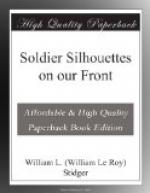What was the difference? He had gotten a letter.
[Illustration: What was the difference? He had gotten a letter.]
Then there is the Silhouette of Physical Suffering. Hundreds of these sombre silhouettes stand out against a lurid background of fire and blood. One only I quote because it has a fringe of hope.
The boy’s back was broken. It had been broken by a shell concussion. There were no visible signs of a wound on his body anywhere, the doctors told me in the hospital. He did not know it as yet. He thought it was his leg that was hurt. They asked me to tell him, as gently as I could. It was a hard task to give a man.
He was lying on a raised bed so that, when I went up to it, it came up to my neck almost, and when I talked with the lad I could look straight into his eyes. Those eyes I shall never forget, they were so fearless, so brave, and yet so full of weariness and suffering.
I took his hand and said: “Boy, I am a preacher.” For once I didn’t say anything about being a secretary. I just told him I was a preacher.
He said: “I am so glad you have come. I just wanted to see a real, honest-to-goodness preacher.” He forced a smile to accompany this sentence.
“Well, I’m all of that, and proud of it,” I replied, smiling back into his brave eyes.
“I’m so tired. I try to be brave, but I’ve been lying here for three months now, and my leg doesn’t seem to get any better. It pains all the time until I think I’ll die with the agony of it. I never sleep only when they give me something. But I try hard to be brave.”
“You are brave!” I said to him. “They all tell me that, the doctors and nurses.”
“They are so good to me.” he said in low tones so that I had to bend to hear them. “But my leg; they don’t seem to be able to help me.”
Then I told him as gently as I could that it was not his leg, that it was his back, and that he would likely not get well. Then I tried to tell him of the room in his Father’s house that was ready for him when he was ready to accept it, and of what a glorious welcome there was there.
He reached out for my hand in the semi-darkness of that evening. I can feel his hand-clasp yet. I didn’t know what to say, but a phrase that had lingered in my mind from an old story came to the rescue.
“Don’t you want the Christ to help you bear your pain?” I asked him.
“That is just what I do want,” he said simply. “That was why I was so glad you came—an honest-to-goodness preacher,” and he smiled again, so bravely, in spite of his suffering, and in spite of the news that I had just broken to him.
Then we prayed. I stood beside his bed holding his hand and praying. The room was full of other wounded boys, but in the twilight I doubt if a lad there knew what we were doing. I spoke low, just so he could hear, and the Master knew what was in my heart without hearing.




